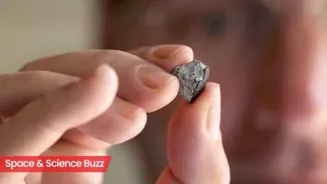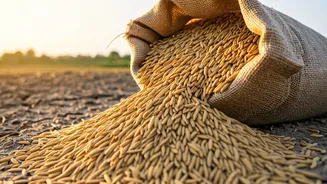Here are today’s most important updates from the realm of Science and Space.
Before Earth Existed, This Meteorite Was Born - Now It’s in a House
A new study has found that a meteorite that crashed into a home in Atlanta,
Georgia, is estimated to be 4.56 billion years old, older than our planet Earth. On June 26, a meteorite blazed through Georgia's skies in broad daylight before exploding, as per NASA. Researchers at the University of Georgia analysed fragments of the extraterrestrial rock to classify it and trace its origins. Their analysis revealed that the meteorite, which formed 4.56 billion years ago, is approximately 20 million years older than Earth. Meamwhile, the homeowner reported still finding traces of space dust around his property from the impact. Named the McDonough meteorite, the object is the 27th meteorite recovered in Georgia.
IIT Roorkee’s Medical Breakthrough Could Save Millions

Researchers at the Indian Institute of Technology Roorkee have developed a new drug candidate that could restore the power of a critical antibiotic against one of the world's most dangerous superbugs. The discovery offers renewed hope in the escalating battle against antimicrobial resistance (AMR). The research team designed a novel molecule, Compound 3b, that works with a potent antibiotic Meropenem. This combination therapy has shown the ability to treat infections caused by Klebsiella pneumoniae, a pathogen designated as a top-priority threat by the World Health Organization (WHO) due to its resistance to multiple drugs. Compound 3b is a type of drug that prevents bacteria from using enzymes to destroy antibiotics. Currently under pre-clinical trial, the compound showed promising therapeutic results.
Golden, Crispy… Risky? New Study Warns About French Fries & Diabetes

Eating three servings of French fries a week is associated with a 20% increased risk of developing type 2 diabetes, but eating similar amounts of potatoes cooked in other ways -- boiled, baked or mashed does not substantially increase the risk, finds a new study. Potatoes contain several nutrients including fiber, vitamin C, and magnesium, but they also have a high starch content and therefore a high glycemic index, so have been linked to a higher risk of developing type 2 diabetes. Replacing three weekly servings of total potato with whole grains lowered the type 2 diabetes rate by 8%, researchers mentioned.
NASA Astronaut’s Photo Reveals Ganga Delta’s Breathtaking Beauty
Ganges river delta, over India and Bangladesh, photographed in near-infrared from the ISS. It is the largest river delta on Earth. pic.twitter.com/RXWgz7w0RQ
— Don Pettit (@astro_Pettit) August 7, 2025
(Credit: X/@astro_Pettit)
NASA astronaut Don Pettit has shared a breathtaking near-infrared image of the Ganges River delta, captured from the International Space Station (ISS) during his Expedition 73 mission. Posted on social media, the image offers a rare, high-contrast perspective of the world’s largest river delta, dramatically highlighting its vast, fertile landscapes spanning parts of eastern India and Bangladesh. The Ganges–Brahmaputra Delta, also known as the Bengal Delta or Sundarbans Delta, covers more than 100,000 sq km and empties into the Bay of Bengal.
















